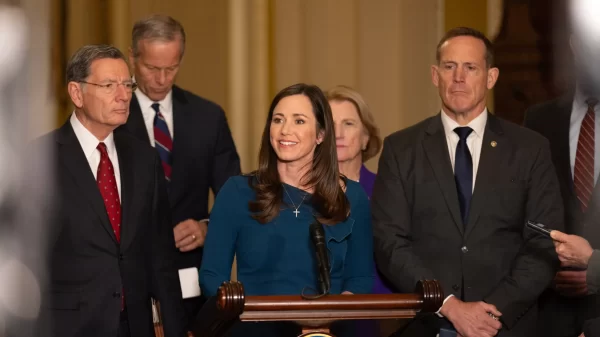U.S. Sen. Doug Jones, D-Alabama, on Wednesday, spoke to a luncheon meeting that was part of the annual Space & Missile Defense Symposium in Huntsville.
“It is really stunning what Alabama contributes to this nation’s national security,” Jones said. “I am really proud of where we are in our nation’s security.”
“We need to make sure that we do in Congress to give you what you need,” Jones said.
“We passed the National Defense Authorization Act (NDAA) of $750 billion,” Jones said. “The NDAA was passed through the work of Senator Jack Reed and Jim Inhofe, who conducted that we got $750 billion in a bipartisan way.”
Jones serves on the U.S. Senate’s Armed Forces Committee.
“I know how important Armed Services is,” Jones said. “We have got a Senator on Appropriations, I think you know him.”
“Those kids are just amazing,” Jones said of troops from Alabama that he met in Afghanistan and Iraq.
Sen. Jack Reed, D-Rhode Island, is the ranking member on the Senate Armed Services Committee.
“As Jones said, we traveled through Afghanistan and Iraq together to meet the young men and women serving in our armed forces there,” Reed said. “What we do here in Huntsville is about giving those young men and women what they need to win on the battlefield.”
“The budget control act was threatening to put us back in sequestration,” Reed said. “The Budget Control Act allows us to have predictability. We have raised the Defense budget $20 billion above the proposed cap to $738 billion at least for the next two years,” Reed said. “Getting the Appropriation bill passed before we go into a C.R. or a long term C.R. is the goal when we get back in September.”
“Huntsville is more important than it is ever been,” Reed said. “It is critical to the security of the United States.”
Reed said that upgrading the nuclear triad, increasing our ability to fight in space, and missile defense are the key goals of the national defense strategy.
“Put those three together, and you get one thing: Huntsville,” Reed said.
“In 2010, we determined that we needed to modernize the nuclear triad: the bombers, the missiles and the ballistic missile submarines,” Reed said. “This will be the third time that we have had to modernize. The first time was in the sixties and the second time was in the eighties.”
“Our nuclear deterrent is absolutely critical,” Reed said. “Russia is modernizing its nuclear triad and China is launching ballistic missile submarines.”
“The last B52 was produced in 1962,” Reed said. “When it retires in 2040, it will be 80 years old. The pilots will be the great grandchildren of the original generation of pilots. The B21 is its replacement.”
Reed said that the Columbia class is the next generation of ballistic missile submarine. “Our current ballistic missile submarines are 40 years old. It is absolutely necessary to replace these ships they are wearing out.”
“We need new ICBMs,” Reed said. “People say, but that you never use them. The success of these weapons is that we have never had to use them. Everything hinges on our nuclear deterrent.”
“It is going to be complicated, and it is expensive,” Reed told the audience of military officers, scientists, engineers, and defense contractors. “We are going to turn to Huntsville more and more to get this done.”
“We have to have war-fighting ability in space,” Reed said. “In the 1960s space was a benign thing. Now we have to recognize that space is not just something is up there for military purposes; but your smart phones, weather forecasting, depends on space. Our economy could be fundamentally undermined if those satellites were attacked.”
“There are some differences in the House and Senate versions of the Space Force,” Reed said. “I am confident that we will have a Space Command by this time next year.”
Reed said that we need space based sensors. “Hypersonics are changing the game every day. We have to be able to identify these new systems, particularly from space, track these new systems and destroy these new systems, and we increasingly are looking to Huntsville for solutions.”
Reed said that quantum computing is a game-changer.
“We need to figure that out before our enemies do.” Reed said. “We need to make sure that we have the workforce needed to work on and develop the technologies that we need going forward. To do that we need and education system that produces graduates with STEM ability and we have to make sure that we get the best talent from all over the world.”
NDIA David Hatchett announced that retired Lt. General Joe Cosumano is the 2019 winner of the Medaris Award. The Medaris Award was established in 1981 to recognize a resident of the Tennessee Valley who has made an outstanding contribution to the National Security of the United States.
“What a humbling experience for me and my family,” Cosumano said, who held numerous commands including the Patriot Battalions in Desert Storm and the Future Warfare Center.
“I learned about this concept called ‘lead up.’ The NCOs led me up in all those years in the military,” Cosumano said. “People, organization, mission and resources.”
In 1955, Major General John Medaris was made the first commanding general of Redstone Arsenal in Huntsville.
Over 530 attended Wednesday’s luncheon. The luncheon was sponsored by Radiance Technologies. Boeing was the sponsor of the Symposium.




















































